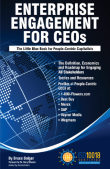Is Recognition Beginning the Shift from Rewards to Performance?
For over two decades, the recognition field has talked about how to shift the focus from rewards to culture and performance. Now, as the pandemic has put so much attention on employee engagement, retention, and willingness to refer, some of the largest recognition companies appear to be doubling down on the rewards story. ESM checked in with several recognition executives to discuss the current state of the field.
By Bruce Bolger
- Should the Focus Be on Rewards or Strategic Solutions?
- Are Points Platforms the Best Way to Express Appreciation?
- Reward Gateway’s Green: Focus on the Reward Moment
- ESG Reporting Drives More Focus on People in Business
Is the recognition field facing the opportunity of a generation or is it ripe for disruption? Are major suppliers continuing to emphasize the social recognition and reward components of the traditional recognition field, or are they beginning to shift their emphasis to connecting recognition to achieving critical organizational goals? ESM checked in with management at some of the leading companies.
Based on the advertising of some of the best-funded players in the recognition field, the solution to the unprecedented workplace challenges can best be addressed by having customizable technology and great reward solutions, a story that goes back to the 1990s.
The Toronto-based firm Achievers, which was one of the companies to shake up the recognition field in the early 2000s by launching social recognition technology, emphasizes in its current marketing campaign that it offers “a global reward marketplace built for the future of work. By offering reward options that reflect the evolving needs of today’s employees, Achievers enables global organizations to offer their employees a reward they already trust and enjoy, including vouchers from Uber for business.”
Awardco, which recently received $65 million in venture capital investors at a valuation of $900 million, emphasizes that it “is built for optimization, customization, automation and all the other great actions you need for a solid employee rewards and recognition program. We help companies across the globe offer truly rewarding recognition with one easy platform. We offer more choices because employee rewards aren’t one-size-fits-all. Our reward network includes Amazon Business—that’s right, anything you want from Amazon. You can also use your Awardco points for hotels, tickets, company swag stores, gift cards, and charitable donations.”
Should the Focus Be on Rewards or Strategic Solutions?
Given that these claims are not new and that there’s no research to indicate that the ability to select from a wide variety of awards at cost is a major driver of sustainable engagement, retention, and willingness to refer, ESM checked in with executives at several recognition firms to see if their customers remain focused on rewards selection or technology or if they are shifting to a greater focus on promoting key organizational behaviors in a measurable way.
 Chester Elton, Founder of The Culture Works, a prolific author known as the “apostle of recognition” for his tireless promotion of the field since the 1990s along with business partner Adrian Gosnick, believes that the pandemic promises to have a long-lasting effect on the view of people in business. Despite his long commitment to recognition, he barely mentions the word in the interview. To him, the core principles of organizational success are empathetic leadership that bakes culture into the organization’s day-to-day operating system.
Chester Elton, Founder of The Culture Works, a prolific author known as the “apostle of recognition” for his tireless promotion of the field since the 1990s along with business partner Adrian Gosnick, believes that the pandemic promises to have a long-lasting effect on the view of people in business. Despite his long commitment to recognition, he barely mentions the word in the interview. To him, the core principles of organizational success are empathetic leadership that bakes culture into the organization’s day-to-day operating system.
“I do think it’s changing. It is true, for years, CEOs said that people were their most important asset, and yet they weren’t. The pandemic really shed light on this. Many of the companies that really do get it have gotten through this fine. They had no trouble ramping up after the lockdowns because they had a solid culture with committed employees ready to spring into action.”
What leaders have learned, he says, “Is that you can’t just flip a switch to instill a rock-solid culture. Companies are realizing that it’s something you work at every day, that you have to nurture and that if you do it right, the rewards are significant.” He cites the example of the restaurant chain Texas Roadhouse, whose organizational philosophy is based on engaging and retaining its employees. “When the lockdowns ended, Texas Roadhouse was able to ramp up quickly so that on Father’s Day this year its restaurants were able to staff up to meet the demand while so many others couldn’t.” If CEOs don’t get the need to bake people strategy into their plans by now, “They will never get it.”
The No. 1 quality demanded of the next generation CEO? “Empathy,” he states emphatically.
Elton thinks the “Great Resignation” is a misnomer. “It’s not like people won’t go back to work, it’s just a matter of what makes sense to them. At the end of the day, people said, ‘I am not going to do that anymore. I am going to work where they value me and treat me well.’”
It’s an entirely new compact. “There has to be a culture fit, that it matters, and you make a difference, and we’re going to celebrate when we succeed and be there when you need help. I do hope that one of the positive things that comes out of this tragedy is that we will hear the wakeup call and finally understand that people are the true differentiators of our brands.”
Elson says organizations cannot address culture with “bright shiny objects. When we speak at association conferences, at book signings or when we speak individually with people, the issue inevitably gets down to toxic cultures. Companies want a quick ‘whizz bang.’ The question is: how do we create great cultures and sustain them? This is a pivotal moment.”
Are Points Platforms the Best Way to Express Appreciation?
 Dr. Paul White, whose Appreciation at Work book has sold over 500,000 copies and is available in 23 languages used by thousands of organizations, calls the prevalent focus on awards into question. (See ESM: Dr. Paul White—More Insights on Work From Home Trends.) He believes that gifting should be strategic, customized, and genuine, otherwise “rewards become just another version of compensation. To achieve maximum impact, they should be carefully selected with the individual in mind, presented with a hand-written or otherwise personal note that reflects a genuine understanding of the person.” He questions the value of points-programs as currently utilized. “What do they do to create an emotional connection, to make people feel genuinely understood and appreciated? It appears as if they are done more for the convenience of the supplier or company.”
Dr. Paul White, whose Appreciation at Work book has sold over 500,000 copies and is available in 23 languages used by thousands of organizations, calls the prevalent focus on awards into question. (See ESM: Dr. Paul White—More Insights on Work From Home Trends.) He believes that gifting should be strategic, customized, and genuine, otherwise “rewards become just another version of compensation. To achieve maximum impact, they should be carefully selected with the individual in mind, presented with a hand-written or otherwise personal note that reflects a genuine understanding of the person.” He questions the value of points-programs as currently utilized. “What do they do to create an emotional connection, to make people feel genuinely understood and appreciated? It appears as if they are done more for the convenience of the supplier or company.”
Kylie Green, Senior Vice President of Reward Gateway, a global engagement company, says, “We have definitely seen a significant increase in demand for engagement solutions as a result of the pandemic. We’re seeing far greater executive sponsorship as more companies are focusing on meeting changing marketplace conditions, including talent shortages, and the need to support employees in the new world of hybrid workplaces.” (See RRN: UK-Based Reward Gateway Thrives in US Market. Boston-based technology investment firm Great Hill Partners, which purchased the company at a valuation of $217.6 million, recently sold it to Abry Partners and Castk Capital for an undisclosed sum.

Green believes that strategic recognition and reward programs are focused on a holistic view and seek ways to recognize all employees, frequently and earlier in their tenure. “Our rewards and recognition programs have company values, stratregic goals and employee performance at their core. This means that when employees are rewarded and redeem their points from a reward program, they know it's for the actions, value, and inpact they had on the organization. Reward and recognition are an important piece that help employeers reinforce company culture and values, especially over the last two years with a greater proportion of employees working in remote and/or hybrid environments. Therefore, we are partnering with our clients to help change cultures by creating as many moments as we can to enhance visibility on the behaviors and actions that drive success, irrespective of how and where people are working."
Reward Gateway’s Green: Focus on the Reward Moment
This carries over into the reward strategy. “What’s important is not only how we create a recognition moment but how we also create an impactful reward moment. We want to keep the focus on the behaviors the reward signifies rather than just the reward itself. This mindset also extends to the redmption experience. If you think of how broad demographics are today, breadth of choice is paramount. Our focus is on creating an instant and memorable reward moment that offers flexibility and choice with a full range of options, including access to the full Amazon catalog at market rates, hundreds of gift cards along with charitable giving, or custom awards that are unique to an organization and culture, such as lunch with a leader or a special parking spot.”
The goal of the redemption experience, she says, is to enable employees to see what they can work toward, with the confidence that whatever they select will be delivered when promised. “How can you create a reward experience that makes people feel the value of their contribution and its impact on the organization and its goals, so that employees look forward to another reward." For leaders, it’s an opportunity to positively reinforce progress, aligned to the behavior and value for the actions the company wishes to be repeated.”
 Tom Short, Founder and Chief Customer Officer of Kudos.com, agrees. His company says it helps companies “build a thriving culture” to “experience the impact of performance recognition™.” (See ESM: Kudos Drives Shift in Employee Recognition Space.) “Almost every single client or prospect concerned about the hybrid work environment and how to maintain and enhance culture in this distanced environment. They are looking for solutions to enhance communications, maintain culture, maintain productivity…Competition for talent has greatly increased as companies can now hire people working almost anywhere. Work-life issues have become paramount.”
Tom Short, Founder and Chief Customer Officer of Kudos.com, agrees. His company says it helps companies “build a thriving culture” to “experience the impact of performance recognition™.” (See ESM: Kudos Drives Shift in Employee Recognition Space.) “Almost every single client or prospect concerned about the hybrid work environment and how to maintain and enhance culture in this distanced environment. They are looking for solutions to enhance communications, maintain culture, maintain productivity…Competition for talent has greatly increased as companies can now hire people working almost anywhere. Work-life issues have become paramount.” Kudos announced that it has raised $10 million from the Canadian Business Growth Fund. No valuation was disclosed.
Short expects his company’s sales and employee count “to double in the next 12 months due to demand. Our philosophy is to put the emphasis on recognition and communication with the ability to provide rewards as appropriate. Our approach to rewards is to create a seamless online experience but they are not the focus of our programs. People love rewards. But what is most important is that appreciation is heartfelt, earnest, and timely, with a shout-out that focuses on the accomplishment and what was achieved. This approach seems to be resonating with our customers. The Millennials and Generation Zs and Alphas coming into the marketplace are not as tied to traditional formats of rewards. This is the communications generation. They want to feel connected and aligned to the vision and mission of company. They want to learn and grow. Money is secondary. Incentives and recognition are high on the list, but not as important as demonstrating to people that they are valued for their contributions.”
ESG Reporting Drives More Focus on People in Business
Short says that companies are putting more focus on highlighting engagement and experiences, “scoring how well their teams are emotionally connected. That is showing up in their annual or ESG (Environmental, Social, Governance) reporting. Employee experience is becoming a differentiator for organizations to signal to the market and to their current employees, investors and end-clients that they are doing the right things to run a great company.”
This, in turn, he says, has resulted in an increased focus on reporting and how programs are being utilized. Clients want to see activity and utilization to understand ebbs and flows and how to better assess and understand the well-being and sentiment of their staffs. That’s where reporting comes in. With Kudos it’s not just a survey, that’s hindsight. With a real-time product like Kudos, clients gain real-time insight they can use to be more proactive. That’s when the CEOs' eyes open—when they realize they can get real-time information on the well-being of their teams. That’s where the reporting comes in.”
On the communication front, “We’re continuing to further expand our ability to help organizations to consolidate many of their employee engagement and experience through a culture accelerator, a unique tool in that it allows you to communicate key initiatives quickly and easily. You also get expert consulting. So that you can build out your recognition, so you can build out wellness, charitable giving, whatever levers, those things can now be communicated and shared through Kudos’ culture hub. How can we provide what people want and make the lives easier for human resources by reaching more people. Reporting dashboards enable companies to understand what’s going on real-time.”
Our focus on recognition communication, with the ability to add rewards, seems to be a philosophy and format that is resonating. It reduces expenditures on things that don’t have lasting impact but can spiral out of control and be gamed. You can’t just pamper or dote on only the top performers, because everyone can be a top performer if you treat them correctly.”
ESG reporting is a welcome development, he says. “It’s shining a light on the fact that culture is critical to success. It’s not what you say it’s what you do. ESG reporting is more authentic and measurable than awards, and you can’t improve what you don’t focus on. Anyone can fill out a form and write an application to make your company look good by winning an award. What counts is reporting on what an organization actually does.”
For More Information
President, CEO, The Culture Works
704-804-1054
President, Appreciation at Work
316-681-4431
Senior Vice President, Global Sales, Reward Gateway
61-2-9112-0100
Founder & Chief Customer Officer, Kudos
587-955-9191
Master the “S” of Environmental, Social, Governance (ESG), A.k.a. Stakeholder Capitalism
The Enterprise Engagement Alliance at TheEEA.org is the world’s first and only organization that focuses on outreach, certification and training, and advisory services to help organizations achieve their goals by fostering the proactive involvement of all stakeholders. This includes customers, employees, distribution and supply chain partners, and communities, or anyone connected to an organization’s success.
Training and Thought Leadership
- Founded in 2008, the Enterprise Engagement Alliance provides outreach, learning and certification in Enterprise Engagement, an implementation process for the “S” or Social of Stakeholder Capitalism and Human Capital Management and measurement of engagement across the organization.
- The Enterprise Engagement Alliance provides a training and certification program for business leaders, practitioners, and solution providers, as well as executive briefings and human capital gap analyses for senior leaders.
- The EEA produces an education program for CFOs for the CFO.University training program on Human Capital Management.
- Join the EEA to become a leader in the implementation of the “S” of ESG and Stakeholder Capitalism.
- The ESM information portal and The Enterprise Engagement Advisors Network solution provider marketplace cover all aspects of stakeholder engagement, and the EEA information library lists dozens of resources.
- The RRN information portal and Brand Media Coalition marketplace address the use of brands for gifting, incentives, recognition, and promotions. The BMC information library provides information and research resources.
Video Learning
The EEA Human Capital Management and ROI of Engagement YouTube channel features a growing library of 30- to 60-minute panel discussions with leading experts in all areas of engagement and total rewards.
- Enterprise Engagement for CEOs: The Little Blue Book for People-Centric Capitalists. A quick guide for CEOs.
- Enterprise Engagement: The Roadmap 5th Edition implementation guide. A comprehensive textbook for practitioners, academics, and students.
Enterprise Engagement Advisory Services
The Engagement Agency helps:
- Organizations of all types develop strategic Stakeholder Capitalism and Enterprise Engagement processes and human capital management and reporting strategies; conduct human capital gap analyses; design and implement strategic human capital management and reporting plans that address DEI (Diversity, Equity, and Inclusion), and assist with managed outsourcing of engagement products and services.
- Human resources, sales and marketing solution providers profit from the emerging discipline of human capital management and ROI of engagement through training and marketing services.
- Investors make sense of human capital reporting by public companies.
- Buyers and sellers of companies in the engagement space or business owners or buyers who seek to account for human capital in their mergers and acquistions.
For more information: Contact Bruce Bolger at Bolger@TheICEE.org or call 914-591-7600, ext. 230.
















